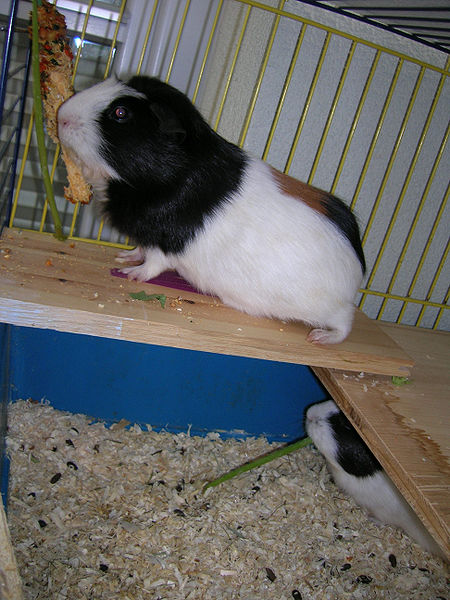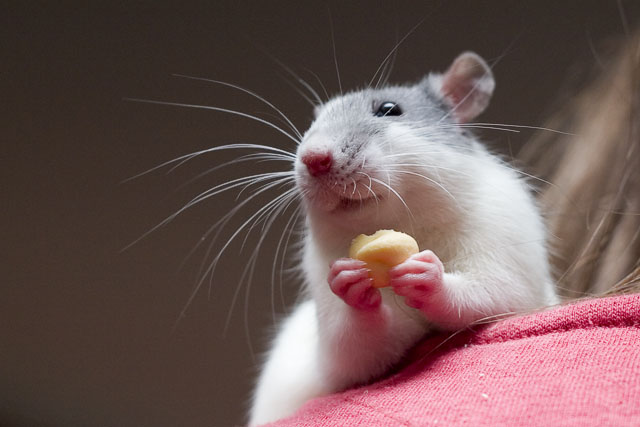Now onto some interesting things I’ve heard about some smaller pets.
Guinea Pig Gossip
I’ve actually heard people say that a guinea pig’s eyes will fall off out you pick him up by the tail.
This ridiculous myth has been around for decades. I have no idea where it came from, but I can debunk it with one simple fact….guinea pigs don’t have tails!
The idea that Guinea pigs can live with rabbits is a common bit of misinformation.
 Guinea pigs and rabbits should not be housed together, simply because the two species are too different in care requirements for this to make sense. Rabbits require rabbit pellets and guinea pigs must eat guinea pig pellets. Even though the two foods look the same, they are formulated differently and should not be fed to the wrong species. Guinea pigs also have clawed, rat like feet while rabbits have heavily padded flat feet with very strong legs, so the cage must match the animal’s foot type. While a rabbit can live on wire, a guinea pig might hurt himself. While a guinea pig can live on flat ground, a rabbit might slip and slide all over! Rabbits are strong and use their back legs to kick themselves forward. One misplaced kick can kill a guinea pig. Don’t house them together, but feel free to let your guinea pig and rabbit play together on the floor once in a while with your supervision.
Guinea pigs and rabbits should not be housed together, simply because the two species are too different in care requirements for this to make sense. Rabbits require rabbit pellets and guinea pigs must eat guinea pig pellets. Even though the two foods look the same, they are formulated differently and should not be fed to the wrong species. Guinea pigs also have clawed, rat like feet while rabbits have heavily padded flat feet with very strong legs, so the cage must match the animal’s foot type. While a rabbit can live on wire, a guinea pig might hurt himself. While a guinea pig can live on flat ground, a rabbit might slip and slide all over! Rabbits are strong and use their back legs to kick themselves forward. One misplaced kick can kill a guinea pig. Don’t house them together, but feel free to let your guinea pig and rabbit play together on the floor once in a while with your supervision.
Rantings on Rats
Rats have diseases. It might be one of the most common things I hear people say.
All animals have the potential to spread disease. I get asked about Rabies a lot, and here are the facts. Rabies MUST be transmitted to a mammal with a bite or scratch. It cannot be contracted through the air and animals cannot be born with the virus. The odds of a pet rat or any other indoor pet having Rabies is very low unless that animal has been kept outside and bitten by an infected animal. The Black Plague and other diseases typically associated with rats come from the fleas that were carried by wild Black Rats in those times. Since our pet rats are raised and kept indoors and their cages are cleaned frequently, you will not have to worry about such diseases. Dirty cages can breed bacteria, fungus, and Salmonella, which can be spread to people, but this is true of ANY environment. Keep the cage clean!
Keeping pet rats will attract wild rats to your home, or at least thaat’s what some people think.
 Wild rat infestations can be caused by numerous things, but they are not attracted to our pet rats. Usually rats invade homes that are close to a food source and/or have food laying out, and places with holes in the walls where they can crawl in and make a nest. Yes, if you leave your pet rat’s food scattered out (or any other food for that matter), a wild rat wouldn’t hesitate to take a nibble, but more than likely if you have wild rats invading your home, they were attracted for other reasons and not by your pets.
Wild rat infestations can be caused by numerous things, but they are not attracted to our pet rats. Usually rats invade homes that are close to a food source and/or have food laying out, and places with holes in the walls where they can crawl in and make a nest. Yes, if you leave your pet rat’s food scattered out (or any other food for that matter), a wild rat wouldn’t hesitate to take a nibble, but more than likely if you have wild rats invading your home, they were attracted for other reasons and not by your pets.
Rats bite. Every animal has the potential to bite if provoked, teased, injured, or if it is sick, and rats are no different, but because of their role as the bad guy in horror movies and other ventures, they are seen as angry blood lusting vermin. Pet rats were domesticated to aid in medical research, so the scientists who bred them had to be able to pick them up and handle them without being bitten. Over the many generations, the descendants of these lab rats have been bred into tame, affectionate, lovable animals that generally will not bite if raised correctly.
Chinchilla Chatter
You may have heard that Chinchillas will die if you get them wet.
This is sort of a half-truth. If a chinchilla gets wet and is allowed to stay wet for a long time, he could get a cold or a fungus could start to grow in his fur, causing illness and death. Generally you should not bathe your chinchilla, but if you do, make sure you blow dry him until he is completely dry to avoid him getting sick. Dust baths are preferred over water baths!
Some people think that Chinchillas are hybrids, not their own species.
Because of their appearance, a lot of people believe them to be a mix of rabbit and squirrel, but chinchillas their own, naturally evolved species and did not come from some freak gene splicing experiment. Since rabbits and squirrels are vastly different species, a successful mating between them is impossible.
It is also commonly thought that Chinchillas prefer hot climates.
Quite the opposite! Chinchillas hail from the arid mountainous regions of South America. They love cool, dry weather and can even die from overexposure to temperatures over the mid-seventies. Keep your pets in an air conditioned room and do not take them outside, as fluctuating temperatures are bad for their health.
Husky Rat image referenced from wikipedia and originally posted by AlexK100
 That Pet Blog That Pet Place Pet Blog
That Pet Blog That Pet Place Pet Blog

